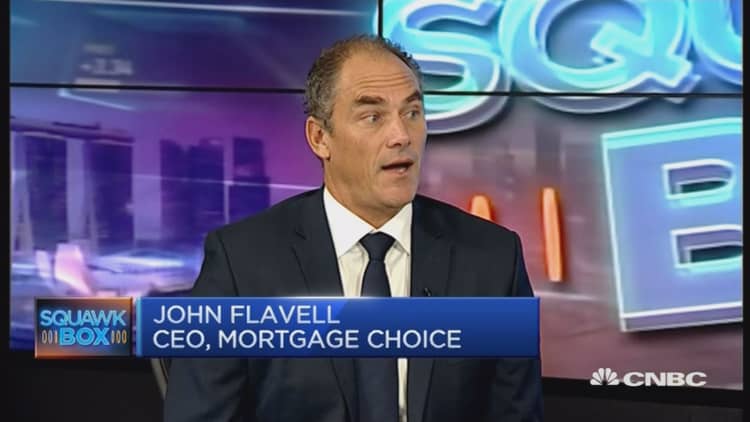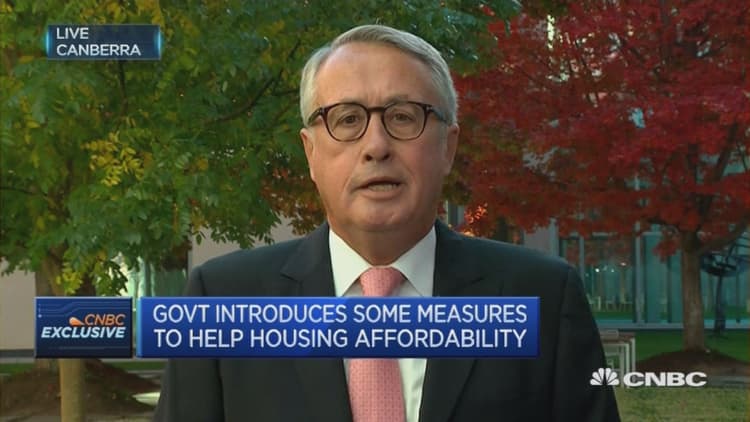
Australia's long-suffering wanna-be homebuyers were likely to be disappointed by the housing affordability measures in the country's 2017-18 budget, analysts said.
John Flavell, CEO of Australian mortgage broker network Mortgage Choice, told CNBC's "Squawk Box" on Wednesday that out of the nine budget measures aimed at addressing housing affordability, at least three might actually drive up demand.
"What we've got is a series of irrelevant pops and fizzles as opposed to the big bang," Flavell said.
The relatively tepid housing measures included increasing a capital gains tax discount for affordable-housing investments, offering lower-tax options for first-time homebuyers trying to save up a home deposit and efforts to encourage seniors to downsize their home.
Home prices have loomed large in Australia's political landscape as affordability plunged, vexing monetary policymakers who were stuck between the rock of a slow economy and the hard place of soaring housing prices.
Demographia data for the third quarter of 2016 showed the median housing price in Sydney was 12.2 times more than the median household income. In Melbourne, the median home price was 9.5 times more than the median income. Comparatively, in the priciest market, Hong Kong, the median home price was 18.1 times more than the median income.
In April, home prices in Sydney were flat on-month, but up 16.0 percent on-year, while Melbourne prices rose 0.5 percent on-month and 15.3 percent on-year, according to data from CoreLogic.
Overall, CoreLogic's data showed home prices rose by 0.1 percent on-month in April across the country's capital cities, the weakest rise since December 2015.
Wayne Swan, a former deputy prime minister for an opposition Labour party government, told CNBC's "The Rundown" on Wednesday that despite analysts' protestations, he believed the country had a "huge bubble" in the housing sector.
"It's making houses unaffordable for many Australians, but it's also if you like, changing investment patterns in the economy in a not very good way," Swan said. "They should have moved comprehensively on doing something about negative gearing and the capital gains tax discount."
The budget measures only made cosmetic changes to the controversial "negative gearing" rules for property investors.
Negative gearing rules allow buyers to borrow funds to buy a property with the expectation that the mortgage repayments will be larger than the rental income, then offset that "loss" against their taxable income - a system that makes owning real estate as an investment an attractive option.
Added incentive comes from the capital-gains-tax system, under which 50 percent of capital gains made on investment assets held for a full year are tax free.
The budget tinkered with how to calculate expenses for negative gearing and removed travel expenses as a deduction.
"When we are so heavily invested in investment property, anybody that turns around that's going to touch any elements around that Is treading on some pretty politically sensitive areas," Mortgage Choice's Flavell noted.

That was a sentiment echoed by Andrew Leigh, the shadow assistant treasurer and a member of parliament from the opposition Labour party.
Leigh said the budget did nothing to improve housing affordability and pointed the blame at the combination of the capital-gains system and negative gearing.
"The typical landlord in Australia makes a lot. It wasn't true in the 1990s, but with these two policies together, Australian landlords make successive, recurrent losses in the hope of a future capital gain," Leigh told CNBC's "Capital Connection" on Wednesday. "People are willing to do that to reduce their tax bill and in the process, investors are just crowding out first-home buyers across the nation."
To be sure, it wasn't clear that the negative-gearing rules had much bearing on Australia's housing boom.
The Property Council of Australia noted in April that abolishing negative gearing was likely to reduce property values at most by only 2 percent.
It cited Australian Tax Office data indicating that close to 1.3 million Australians, out of the just over 2 million who own an investment property, use negative gearing, but that the average deduction was just A$8,702. Australia's total population is around 24 million people.
Other measures could even be counterproductive for efforts to stem home prices' march higher, such as efforts to help first-time homebuyers save a deposit and help seniors downsize, analysts said.
"We suspect that these measures will assist supply at the margin but will take some time to have any impact on prices," analysts at Bank of America Merrill Lynch said in a note on Wednesday. "However, these measures may be offset by increased first-home buyer demand, which could be quicker to respond. We expect that this will simply increase demand at the lower end of the property spectrum."
The analysts didn't think the efforts to spur seniors to downsize would have much impact.
"Stamp duties that are imposed at a state level remain a large deterrent for housing turnover," they said.
Indeed, Swan said the measures to help first-time homebuyers save up a deposit were just a "token gesture."
He noted that this was a less-generous version of a Labour-party measure that was discontinued in 2014.


